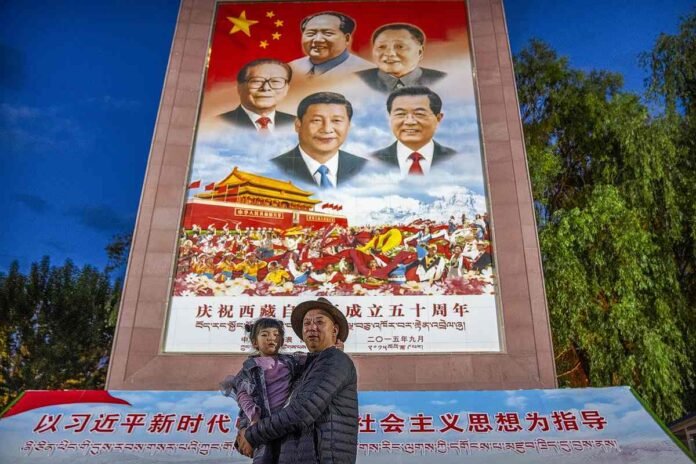A man holds a girl as they pose for a photo in front of a large mural of Chinese President Xi Jinping, bottom center, and other Chinese leaders in a public square in Lhasa in western China’s Tibet Autonomous Region on June 1, 2021.
11:57 JST, June 1, 2024
TAIPEI (AP) — China is accelerating the forced urbanization of Tibetan villagers and herders, Human Rights Watch said, in a wide-ranging report contributing to state government and independent reports on efforts to assimilate rural Tibetans through control of their language and traditional Buddhist culture.
The international rights group cited numerous Chinese internal reports contradicting official statements that all Tibetans who were forced to move, with their former homes destroyed upon departure, did so voluntarily.
The removals follow a pattern of often violent demands that ethnic minorities adopt the state language of Mandarin and pledge allegiance to the ruling Communist Party in western and northern areas home to millions of people from Tibetan, Xinjiang Uyghur, Mongolian and other minority groups.
China claims Tibet has been part of its territory for centuries, although it only gained firm control over the Himalayan region after the Communist Party came to power during a civil war in 1949.
“These coercive tactics can be traced back to the pressure placed on local officials by higher-level authorities who routinely characterize the relocation program as a non-negotiable, politically critical policy coming straight from the national capital Beijing, or from Lhasa, the regional capital. HRW said in the report. “This leaves local officials no flexibility in implementation at the local level and requires them to obtain 100% consent from affected villagers to relocate.”
According to the report, official statistics suggest that by the end of 2025, more than 930,000 rural Tibetans will have been displaced to urban centers where they are deprived of their traditional sources of income and struggle to find work. Lhasa and other major cities have attracted large numbers of migrants from China’s dominant Han ethnic group, who dominate politics and the economy.
More than 3 million of the more than 4.5 million Tibetans in rural areas have been forced to build houses and give up their traditional nomadic lifestyle based on yak herding and agriculture, the report said. Together with the official Tibet Autonomous Region, Tibetans form communities in the neighboring provinces of Sichuan, Yunnan and Qinghai.
“These displacements of rural communities are eroding or causing great damage to Tibetan culture and ways of life, not least because most relocation programs in Tibet move former farmers and herders to areas where they cannot pursue their previous livelihoods and have no choice but to work as wage workers in industries outside agriculture,” HRW said.
China has consistently defended its policy in Tibet as bringing stability and development to a strategically important border region. The region last saw anti-government protests in 2008, which led to a massive military crackdown. Foreigners must apply for special permission to visit the country and journalists are largely excluded, with the exception of those working for Chinese state media.
China consistently says allegations of human rights abuses in Tibetan regions are baseless accusations aimed at tarnishing China’s image. Last August, Foreign Ministry spokesman Wang Wenbin said human rights conditions in Tibet were “at their historic best.”
“The region has long enjoyed a flourishing economy, a harmonious and stable society and effective protection and promotion of cultural heritage,” Wang said at the time. “The rights and freedoms of all ethnic groups, including freedom of religious belief and the freedom to use and develop their ethnic groups’ spoken and written languages, are fully guaranteed.”
China, with its population of 1.4 billion people, claims to have eradicated extreme poverty, largely by moving isolated homes and small villages into larger communities with better access to transportation, electricity, health care and education. These claims have not been independently verified.
China’s economic growth has slowed significantly as its population ages and youth unemployment has risen, even as Chinese industries such as EV cars and mobile phones increase their market share abroad.
HRW recommended that the UN Human Rights Council conduct an independent investigation into human rights violations committed by the Chinese government in Tibet and other areas.



